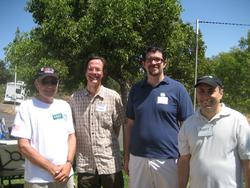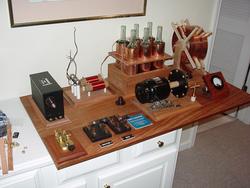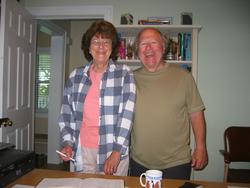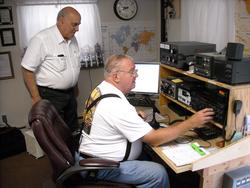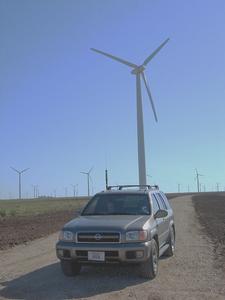 October 14, 2009 Editor: Ward Silver, NØAX | ||||||
IN THIS ISSUE
NEW HF OPERATORS - THINGS TO DO Prepare yourself for a seriously busy weekend on the 24th and 25th of October as the CQ World Wide Phone contest comes to the HF bands. Even the little pistol can expect to fill a log with DX from around the world on multiple bands. Once you turn on the radio, resistance will be futile! BULLETINS There are no bulletins in this issue. BUSTED QSOS The caption for the photo of Jim AD4EB in the previous issue erroneously gave his name as "Jay". CONTEST SUMMARY Complete information for all contests follows the Conversation section Oct 17-18
Oct 24-25
NEWS, PRESS RELEASES, AND GENERAL INTEREST
WRTC-2010 continues to take shape with the announcement of Team Leaders. The new method of selecting team leaders by compiling contest scores has resulted in a number of new call signs in the mix. There have been some changes over the past week, so keep an eye on the WRTC-2010 Web site. Who will the Team Leaders will select as their partners? Referees are now being nominated and volunteering their applications. A video of the 2009 Russian Radiosport Team Championship is also available, showing the same locations and conditions for WRTC-2010. (Thanks, Harry RA3AUU) Jamboree on the Air (JOTA) is coming up this weekend. It's a great way to put a contesting station to work showing ham radio to the scouts. You can contact the local Scout troop to offer your services or get on the air and if you hear a JOTA group needing a contact, give them a call! By the way, amateur satellite AO-51 will be reconfigured to an FM voice 145.880 MHz uplink and 435.150 MHz downlink (no tone requirement) during JOTA. After JOTA, set aside some time next week to make some QSOs with school radio clubs in the ARRL School Club Roundup (see the contest listings below). CQ WPX Director, Randy K5ZD has started another survey about the contest regarding the rules for Multioperator, Single-Transmitter (MS) category entries. Anyone with an interest in MS should take a few minutes and make their feelings known. The previous survey on Single-Operator vs Single-Operator, Assisted (Survey #2) is still active as of this issue's date of publication. New VHF+ Contest from South America - the Arucaria VHF Contest (AVHFC) has added a second weekend (17-18 October) this year. It's an international contest on 50 and 144 MHz with rules similar to CQ WW VHF. Transequatorial propagation makes this contest of interest to North American VHF operators! Another VHF+ contest has re-emerged in a new form - the formerly-North American High-Speed Meteor Scatter Contest will use distance scoring (as well as other appropriate rules modifications). Now known as the North American VHF WSJT Group Geminids Test, it will be held on December 12 through December 16. (Thanks, Bill W5WVO)
CW Skimmer author VE3NEA has extended his CW decoding software to new multi-band abilities with SkimmerServer. If you have one of the open-source QS1R direct-sampling software-defined radios, you will be able to monitor multiple bands at one time. (Thanks, Wes WZ7I) W1VE and K1TTT's real-time contest scoreboard is ready to go for the peak of the fall contest season: CQ WW SSB, SS CW, SS SSB, and CQ WW CW. Well in advance of starting the contest, remember to test your logging program to be sure it uploads your score properly. (Thanks, David K1TTT) To help with CQWW preparations Stan EI6DX has put together a CQ WW analysis program that parses all last year's logs, calculates QSO rates, and sums it all up by time, band, zones and other parameters. It runs online using Flash and javascript. If your browser has trouble with these, there is a plain HTML format, too. Here's a thought-provoking science item about "persistent" current that flows forever, another interesting phenomenon of the nano-world. Now, if we could just harness it to call CQ while we tune the second radio. In a related field, the maximum temperature at which superconductivity has been observed is now all the way to 254 degrees K (-19 C or -2 F). That's warmer than North Dakota in January! A press release on the CQ Magazine Web site announces that one of the oldest and most familiar brand names in radio, Astatic, is leaving the scene. A new line of products, CAD Audio, will include the Astatic line of microphones. (Thanks, Jim AD1C) The Contest Update is sorry to report the recent and unanticipated passing of Math Bjerrang, JW5NM, on October 10th. Math was a frequent entry in the results of DX contests, providing the sought-after double multiplier of Zone 40 and Svalbard. That CW signal with the heavy auroral flutter will be missed around the globe. (Thanks, Rich KL7RA) Web Site of the Week - Hotpaw Software has released a Morse code trainer and a CW decoder application for the iPhone. There's even a straight key application! Who will be the first to create iLog - a contest logger application? Hmmm...can you use an iPhone in a CW contest? (Thanks, Vojtech AB2ZA) WORD TO THE WISE Archives - watching as many email reflectors and groups as I do, I see a lot of needless repetition of topics when the answer is easily found with a little searching. Most groups and reflectors have searchable archives on-line. The Web URL is usually included with emails and is certainly given in the welcome email you received on signing up. Before you launch another round of "How can I tell true north with a plastic owl?" on your favorite reflector, browse through the archives! You'll find many interesting things! SIGHTS AND SOUNDS The Potomac Valley Radio Club (PVRC) Webinars are becoming quite popular - and all of them are archived for you to watch at any time. The latest program, certainly of timely interest, is on the CQ World Wide 2009 Contest. CQ WW DX Contest Director Bob Cox K3EST and CQ WW Committee members John K1AR and Doug KR2Q discussed this year's contest, including questions and answers from the audience. Upcoming programs include a look at LZ9W by Wally LZ3CJ on Oct 17 and Propagation Prediction Programs by Carl K9LA. Registration details are all available by clicking the PVRC Webinars link at the top of the home page. (Thanks, Ken K4ZW) From the October issue of the Packrats VHF Club's "Cheese Bits" we learn of a photo essay by Russ K2TXB on his recent trip to Martha's Vineyard for the ARRL 10 GHz and Up Cumulative Contest. There are plenty of technical photos as well as scenery on the island. (Thanks, Lenny W2BVH, Cheese Bits Editor)
John K6MM has updated the venerable Web site of the Northern California Contest Club (NCCC) and now the Golden Gate bridge and NCCC logo are together at last. Here's a YouTube video featuring LP1H, a brand new contest station in Cordoba, Argentina. (Thanks, Martin, LU5DX) Jeff K4BP has posted a great collection of photos from the recent SEDCO convention in Tennessee - fun was had by all! (Thanks, Lynn W4NL) Hewlett-Packard is using ham radio as an example of how their computers are being used in real-life. A short video is followed with a text description of ham radio and how computers are used by hams. (Thanks, Allen W1AGP) Stefan DL7AOS writes, "During the recent IARU Region 1 Field Day we had much fun using a truck-mounted 18-meter crank-up tower and all homemade antennas: Moxon monoband beams for 10-20m, 2 element vertical for 40m and dipoles for 40/80m." You can check out just how much fun by watching this online video! RESULTS AND RECORDS
As everybody gears up for CQ World Wide SSB next week, how about a peek at the record books to see where to set your sights? They're all available on the CQ WW Records page. There is plenty of time to decide you'd like to sponsor a plaque for the CQ WPX Contests. There are some categories without sponsored plaques and you can suggest a new one, if you like! This is a good opportunity for your club to help keep interest high. Send your requests or suggestions to the WPX SSB/CW award manager -- Doug, K1DG. Jim AD1C has a new version of ClubScore - a program for filtering out the scores for a particular club from the 3830 Score Summary emails. The program is still be developed and fine-tuned, so if you try it, let Jim know if you run into any problems. OPERATING TIP Twenty meters - the "money band" around the world for DX contesting at almost any time of the solar cycle. While 15 meters occasionally pokes its nose ahead at the wire, year in and year out, your score will benefit from making sure you and your station work well on this important band. TECHNICAL TOPICS AND INFORMATION Measuring PEP is a bit of guesswork with the usual analog wattmeter, but Marv WC6W has developed a flea-powered PEP converter circuit that converts a wattmeter's display to PEP. This particular circuit works with a conventional Bird 43 wattmeter. Marv's Web site is full of goodies! Making a tap for your oscilloscope to monitor the output of a transmitter may be easier than you think! Rob K5UJ recommends using an antenna switch and letting the position-to-position isolation act as the attenuator necessary. Start by connecting the output feed line into the "common" switch connector and a dummy load to one of the "antenna" connectors. Connect the scope to one of the unused positions. Test the system on low power first to be sure the antenna switch has enough isolation to keep from over-stressing the 'scope input. Not to be left in the Webinar wake, the Top Bander also has a program to enjoy -- a full presentation discussing the city-lot-sized 160 meter antenna of John K6MM in the June 2009 QST. This Webinar is scheduled for the date of this issue (Oct 14) but should be available in the archives, as well, as described earlier in this issue. Take a look at the Webinar quick-start guide and get registered or log on later and watch the program from the archives. Once on the band, Top Banders (and anyone living close to an AM broadcast station) quickly learn the need for BC-reject filters. Jeff F6AOJ has designed several filters to reduce interference so that he can use Beverage antennas on the nearby 160 meter band. (It will help if you speak French a little bit...) Soil chemistry is the key to selecting radial wire that does not deteriorate in the soil, says Red WOØW. Aluminum cannot tolerate alkaline soil with a pH greater than 7.0. Iron, zinc, and copper cannot tolerate acidic soil with a pH less than 7.0. You can get a soil pH testing kit at your local garden center. Whatever type of wire you choose to use as radials, holding those wires down leads to some creative solutions. Ross KB8NTY has developed a useful product called "Antenna Radial Staple Anchor Lawn Pins" that will do the job "just right". The pins are about 2 inches long and have a special shape at the top to capture and secure the wire. They look useful for all sorts of small "hold down" jobs. Steve NU7T posted a long list of propagation and related resources. Here are some of the highlights: If you have an analog meter whose glass face is loose - perhaps from too much "percussive maintenance" - reattaching it with regular glue can leave a mess. Carl KM1H has found that automotive mirror glue works great for reattaching the glass to the housing and is available at most auto parts stores. Clear aquarium sealant is also popular. Before starting that tower climb, why not read this useful article about safety body harnesses? (Thanks, Tom N4NW) The latest issue of Popular Science features the Motorola Endeavor HX1 headset. It's a wireless Bluetooth appliance - nothing new there - but it uses bone conduction to help reject non-speech acoustic noise. This might be useful for 'phone multi-operator contesting and for mobiling.
Technical Web Site of the Week - In set after set of VHF+ contest results, the importance of high-scoring microwave contacts is touted. Without building or buying dedicated microwave equipment, the usual solution is transverters. QST columnist and QEX author Paul W1GHZ has designed several "simple and cheap" transverters for 902 through 3456 MHz, using a 2 meter IF. The PC boards are straightforward to build and might be a great club project! Paul's site is a gold mine of microwave know-how. CONVERSATION Getting Carded Over the past few years, the contest-that-follows-the-contest (i.e. - log checking and adjudication) has taken on additional significance. Beyond log checking's basic mission of insuring that the results have the proper order of finish, contest scores (and disqualifications) are now used as qualifiers (and disqualifiers) for international competitions like WRTC. Thus, what was once a behind-closed-doors process of turning submitted logs into line scores is now attracting much more public interest. This is a Good Thing. Increased awareness of judging should not be taken to mean that cheating in radiosport contests is widespread or that past top scores are uniformly tainted. Not at all! However, it doesn't take many bad signals to ruin a pileup. That's why this week's announcement from the CQ WW Committee (reproduced below) is so important. For the first time, there will be public visibility of (and presumably, accountability for) "problem logs" somewhere between full-blown cheating and accidental infringement. This has been needed for a long time, yet there has not been a well-understood process with appropriate levels of response. Here from CQ WW Director, Bob Cox K3EST, is the CQ WW Committee's new rule that takes effect immediately - not in 2010, but in two weeks. "We would like to take this opportunity to inform you of a change to rule XII of the CQ WW DX contest. This rule deals with disqualification. The statement below is to be substituted for rule XII published in the September issue of CQ magazine. The new [rule] XII will be in effect for the 2009 CQ WW contests. The new rule will have *no effect on 99+% of contesters*. If you stay within the category you have chosen and obey its limitations, rule XII will not affect you. The new rule below replaces rule XII of the 2009 CQ WW DX Contest rules. It is also available at cqww.com along with the full rules..." XII. Actions of the CQ WW Contest Committee YELLOW card = Not eligible for an award in the entered contest. An entrant or operator issued a yellow card will be listed in the published results with a number symbol (#) before their call. Two yellow cards: An entrant or operator receiving two yellow cards in three consecutive CQ WW DX contests will be ineligible for any CQ-sponsored contest award for a period of two years beginning with the publication of the second violation in CQ magazine. If the entrant is in a multi-operator category, all listed operators are so affected. RED card = Full Disqualification (DQ). Submitted log is rejected. Entrants receiving a red card will be listed at the end of the published results. An entrant or operator receiving a red card will be ineligible for any CQ-sponsored contest award for a period of one year beginning with the publication of the violation in CQ magazine. Two red cards: An entry or operator receiving two red cards within five consecutive CQ WW DX contests will be ineligible for any CQ-sponsored contest award for a period of three years beginning with the month of publication of the second violation in CQ magazine. If the entrant is in a multi-operator category, all listed operators are so affected. 1. The CQ WW Contest Committee reserves the right to accept or reject any entry. 2. Violation of the rules of the contest or country of operation makes the entrant subject to either a red or yellow card at the discretion of the CQ WW Contest Committee. Reclassification to a category other than that submitted will result in an automatic yellow card. 3. Unsportsmanlike conduct can be grounds for either a red or yellow card at the discretion of the CQ WW Contest Committee. Unsportsmanlike conduct includes but is not limited to ANY use by an entrant of any non-amateur means in the contest including, but not limited to, telephones, Internet, instant messaging, chat rooms, VoIP, or the use of any DX cluster/reflector to SOLICIT, ARRANGE, or CONFIRM any contacts during the contest (exception see Xtreme category rules). 4. Taking credit for excessive unverifiable QSOs or unverifiable multipliers may result in a yellow card. 5. An entrant is free to withdraw his/her submitted log for any reason prior to receiving an official letter from the CQ WW Contest Committee. The log will then be handled per the entrant's request. If after receiving an official letter from the CQ WW Contest Committee, an entrant chooses to withdraw their log, the entrant's call will be listed at end of the results showing their log as having been withdrawn. 6. By submitting a CQ WW DX contest log, an entrant agrees that the use of red cards, yellow cards, log withdrawal and other decisions of the CQ WW Contest Committee are official and final." I believe this new way of responding to rules violations is a positive step for radiosport. The casual reader might wonder whether cheating must be rampant to warrant such a rule. Cheating is not rampant, but in several cases has become egregious. As a consequence of this rule, cheaters are now put on notice that the risk of detection and the consequences have increased dramatically. It is also positive because it means that more and more operators are participating and take their efforts seriously. The "correct order of finish" is something that all contesters want. We also understand that log checking is not perfect and never will be. But by taking this step, the CQ WW committee has told us all that our efforts are important and worthwhile and appreciated. It is now up to us to act in ways so as to make our best effort according to the highest standards. CONTESTS 14 October to 27 October An expanded, downloadable version of QST's Contest Corral in PDF format is available. Check the sponsor's Web site for information on operating time restrictions and other instructions. HF CONTESTS Great Pumpkin Sprint--Digital, from Oct 17, 8 PM to Oct 18, 2 AM. Bands (MHz): 1.8. Exchange: RST and S/P/C. Logs due: Nov 17. Rules JARTS WW RTTY Contest--Digital, from Oct 17, 0000Z to Oct 18, 2400Z. Bands (MHz): 3.5-28. Exchange: RST and age (YL may send '00'). Logs due: Nov 30. Rules QRP ARCI Fall QSO Party--CW, from Oct 17, 1200Z to Oct 18, 2400Z. Bands (MHz): 1.8-28. Exchange: RS(T), S/P/C, QRP ARCI number or pwr. Logs due: Nov 19. Rules Iowa QSO Party--Phone,CW,Digital, from Oct 17, 1400Z to Oct 17, 2300Z. Bands (MHz): 1.8-28, 50+ Exchange: RS(T) and IA county, state/prov, or "DX". Logs due: Nov 10. Rules Stew Perry Warmup Contest--CW, from Oct 17, 1500Z to Oct 18, 1500Z. Bands (MHz): 1.8. Exchange: Grid square. Logs due: Nov 18. Rules Worked All Germany--Phone,CW, from Oct 17, 1500Z to Oct 18, 1459Z. Bands (MHz): 3.5-28. Exchange: RS(T) and serial or DOK code. Logs due: Nov 20. Rules W/VE Islands QSO Party--Phone,CW,Digital, from Oct 17, 1600Z to Oct 18, 2359Z. Bands (MHz): 1.8-28, 50. Exchange: RS(T) and S/P/C or island designator. Logs due: Nov 30. Rules New York QSO Party--Phone,CW,Digital, from Oct 17, 1800Z to Oct 18, 0600Z. Bands (MHz): 1.8-28, 50+, Frequencies: CW--1.820, 3.550, 7.050, 14.050, 21.050, 28.050; Phone--1.870, 3.825, 7.200, 14.290, 21.350, 28.400. Exchange: RS(T), NY county, state/prov, or "DX". Logs due: 14 days. Rules 10-10-10 Feld-Hell Sprint--Digital, from Oct 17, 2200Z to Oct 17, 2400Z. Bands (MHz): 28. Exchange: RST, Feld-Hell nr, S/P/C, and 10-10 nr. Logs due: 2 weeks. Rules Asia-Pacific Sprint--CW, from Oct 18, 0000Z to Oct 18, 0200Z. Bands (MHz): 14-21. Exchange: RST and serial. Logs due: 7 days. Rules Illinois QSO Party--Phone,CW, from Oct 18, 1700Z to Oct 19, 0100Z. Bands (MHz): 1.8-28, 50,144. Exchange: RS(T) and IL county or S/P/C. Logs due: Nov 18. Rules School Club Roundup--Phone,CW,Digital, from Oct 19, 1300Z to Oct 23, 2400Z. Bands (MHz): 1.8-28, 50+. Exchange: RST, class and S/P/C. Logs due: 30 days. Rules CQ WW SSB Contest--Phone, from Oct 24, 0000Z to Oct 25, 2359Z. Bands (MHz): 1.8-28. Exchange: RS and CQ zone. Logs due: 1 Dec. Rules 10-10 Fall CW QSO Party--CW, from Oct 24, 0001Z to Oct 24, 2359Z. Bands (MHz): 28. Exchange: Call, name, 10-10 number, S/P/C. Logs due: 10 Nov. Rules 10-10 Fall Digital QSO Party--Digital, from Oct 24, 0001Z to Oct 24, 2359Z. Bands (MHz): 28. Exchange: Call, name, 10-10 number, S/P/C. Logs due: 10 Nov. Rules VHF+ CONTESTS Fall VHF Sprints--Phone,CW,Digital, from Oct 17, 6 AM to Oct 17, 12 PM. Bands (MHz): 902+. Exchange: Grid square. Logs due: 4 weeks. Rules Iowa QSO Party--Phone,CW,Digital, from Oct 17, 1400Z to Oct 17, 2300Z. Bands (MHz): 1.8-28, 50+ Exchange: RS(T) and IA county, state/prov, or "DX". Logs due: Nov 10. Rules W/VE Islands QSO Party--Phone,CW,Digital, from Oct 17, 1600Z to Oct 18, 2359Z. Bands (MHz): 1.8-28, 50. Exchange: RS(T) and S/P/C or island designator. Logs due: Nov 30. Rules New York QSO Party--Phone,CW,Digital, from Oct 17, 1800Z to Oct 18, 0600Z. Bands (MHz): 1.8-28, 50+, Frequencies: CW--1.820, 3.550, 7.050, 14.050, 21.050, 28.050; Phone--1.870, 3.825, 7.200, 14.290, 21.350, 28.400. Exchange: RS(T), NY county, state/prov, or "DX". Logs due: 14 days. Rules Illinois QSO Party--Phone,CW, from Oct 18, 1700Z to Oct 19, 0100Z. Bands (MHz): 1.8-28, 50,144. Exchange: RS(T) and IL county or S/P/C. Logs due: Nov 18. Rules School Club Roundup--Phone,CW,Digital, from Oct 19, 1300Z to Oct 23, 2400Z. Bands (MHz): 1.8-28, 50+. Exchange: RST, class and S/P/C. Logs due: 30 days. Rules Fall VHF Sprints--Phone,CW,Digital, from Oct 24, 2300Z to Oct 25, 0300Z. Bands (MHz): 50. Exchange: Grid square. Logs due: 4 weeks. Rules LOG DUE DATES 14 October to 27 October October 15 -- Tennessee QSO Party, email logs to: [email protected], paper logs and diskettes to: Tennessee QSO Party, c/o Doug Smith, W9WI, 1389 Old Clarksville Pike, Pleasant View, TN 37146-8098, USA. Rules October 15 -- RSGB 80m Club Sprint, CW, email logs to: [email protected], Upload log at: http://www.vhfcc.org/cgi-bin/hfcover.pl, paper logs and diskettes to: (none). Rules October 16 -- SKCC Weekend Sprint, Post log summary at: http://www.skccgroup.com/sprint/wes/wes-submit.html, paper logs and diskettes to: (none). Rules October 16 -- SARL 80m QSO Party, email logs to: [email protected], paper logs and diskettes to: Durban Amateur Radio Club, 17 Brownlee Place, Bluff, Durban, 4052, South Africa. Rules October 17 -- North American Sprint, RTTY, email logs to: (see rules, web upload preferred), Upload log at: http://www.ncjweb.com/sprintlogsubmit.php, paper logs and diskettes to: Ed Muns, W0YK, P.O. Box 1877, Los Gatos, CA 95031-1877, USA. Rules d October 18 -- EU Autumn Sprint, SSB, email logs to: [email protected], paper logs and diskettes to: Dave Lawley, G4BUO, Carramore, Coldharbour Road, Penshurst, Kent TN11 8EX, England. Rules October 18 -- UBA ON Contest, 6m, email logs to: [email protected], paper logs and diskettes to: Leon Welters, ON5WL, Borgstraat 80, B-2580 Beerzel, Belgium. Rules October 18 -- International HELL-Contest, email logs to: [email protected], paper logs and diskettes to: A.Schlendermann, DL9GS, Postfach 102201, D-44807 Bochum, Germany. Rules October 19 -- RSGB 21/28 MHz Contest, Upload log at: http://www.vhfcc.org/cgi-bin/hfenter.pl, paper logs and diskettes to: RSGB-G3UFY, 77 Bensham Manor Road, Thornton Heath, Surrey CR7 7AF, England. Rules October 19 -- QRP Afield, email logs to: [email protected], paper logs and diskettes to: Chuck Ludinsky, K1CL, 6 Pracing Rd., Chelmsford, MA 01824-1922, USA. Rules October 20 -- ARRL 10 GHz and Up Contest, email logs to: [email protected], paper logs and diskettes to: 10 GHz Contest, ARRL Contest Branch, 225 Main St., Newington, CT 06111, USA. Rules October 20 -- ARRL 10 GHz and Up Contest, email logs to: [email protected], paper logs and diskettes to: 10 GHz Contest, ARRL Contest Branch, 225 Main St., Newington, CT 06111, USA. Rules October 20 -- South Carolina QSO Party, email logs to: [email protected], paper logs and diskettes to: CARC - SC QP Entry, PO Box 595, Columbia, SC 29202-0595, USA. Rules October 20 -- QCWA Fall QSO Party, email logs to: [email protected], paper logs and diskettes to: W2OD, Robert Buus, 8 Donner Street, HOLMDEL N.J. 07733-2004, USA. Rules October 20 -- CIS DX QPSK63 Contest, email logs to: [email protected], paper logs and diskettes to: CIS DX Contest Committee, P.O. Box 7469, Glasgow, G42 0YD, Scotland, UK. Rules October 21 -- 144 MHz Fall Sprint, email logs to: [email protected], paper logs and diskettes to: Ottmar Fiebel W4WSR, PO Box 957, Hayesville, NC 28904, USA. Rules October 25 -- EU Autumn Sprint, CW, email logs to: [email protected], paper logs and diskettes to: Karel Karmasin, OK2FD, Gen. Svobody 636, 674 01 Trebic, Czech Republic. Rules October 25 -- UBA ON Contest, CW, email logs to: [email protected], paper logs and diskettes to: Leon Welters, ON5WL, Borgstraat 80, B-2580 Beerzel, Belgium. Rules October 26 -- 10-10 Int. 10-10 Day Sprint, email logs to: [email protected], paper logs and diskettes to: Dan Morris, KZ3T, 131 Valencia Lane, Statesville, NC 28625, USA. Rules October 26 -- QRP Homebrewer Sprint, email logs to: [email protected], paper logs and diskettes to: Larry Makoski, W2LJ, 327 Clinton Place, South Plainfield, NJ 07080, USA. Rules ACKNOWLEDGEMENTS ARRL Contest Update wishes to acknowledge information from WA7BNM's Contest Calendar and SM3CER's Contest Calendar. | ||||||
